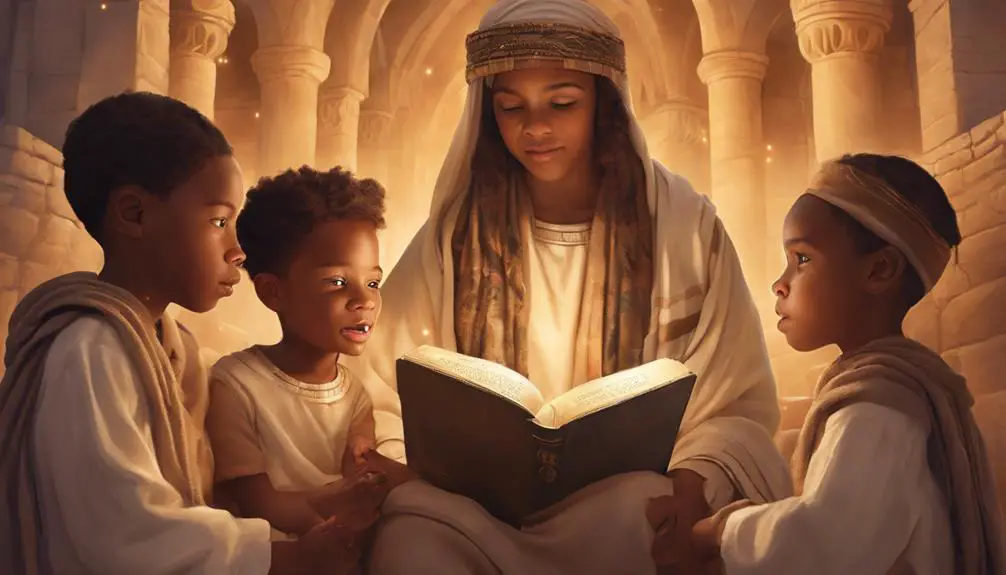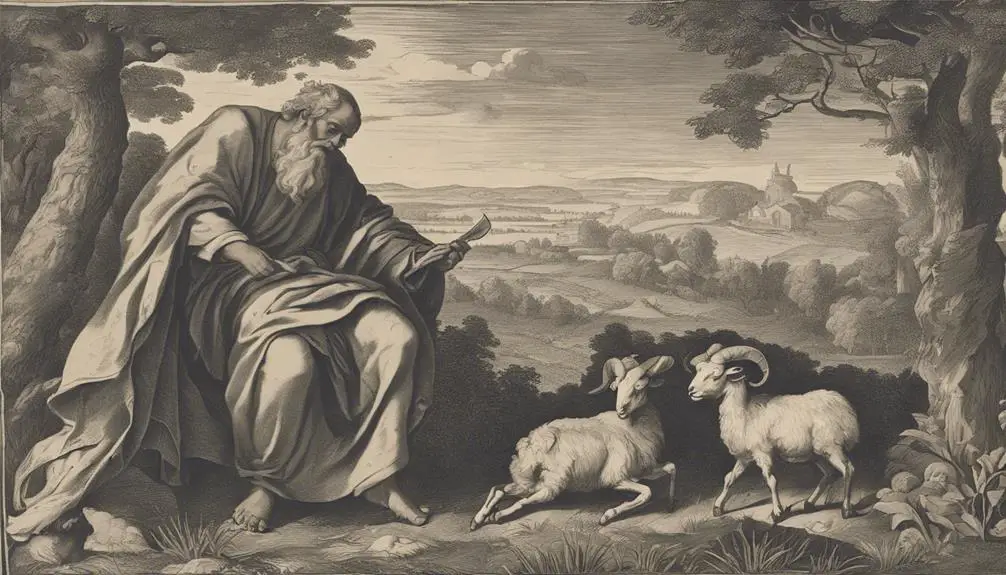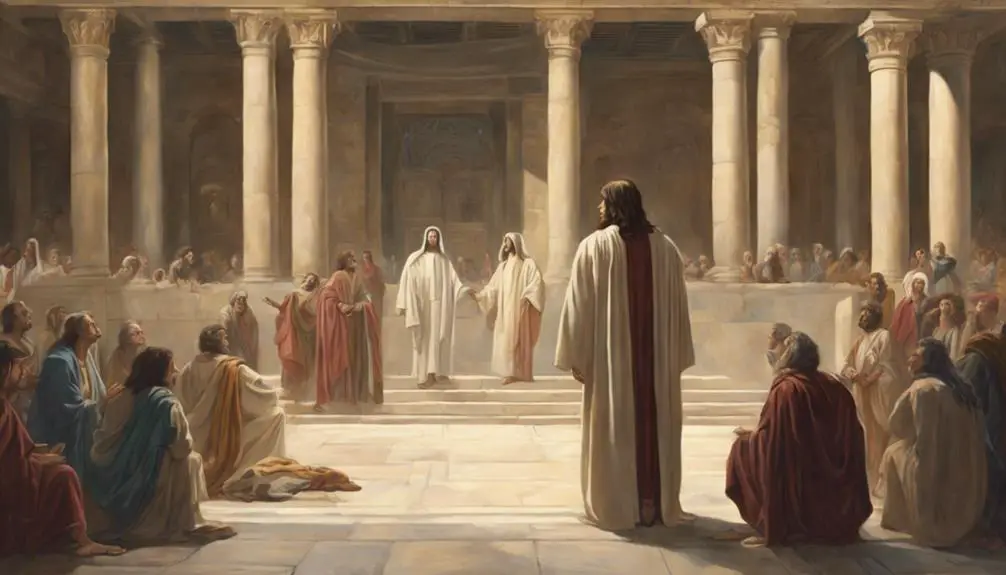Kid protagonists in the Bible offer unexpected, yet profound lessons; explore their fascinating narratives and their contemporary relevance.

Child Characters in the Bible
You've probably never considered this, but the Bible is teeming with narratives involving children who've played pivotal roles.
Whether it's Isaac, the sacrificial son of Abraham, or young David, the anointed shepherd king, these child characters provide unique insights into biblical teachings.
Now, one might wonder about the lessons to be learned from these stories, and their relevance today. So let's embark on this journey together, where you'll find there's more to these child characters than meets the eye.
Key Takeaways
- Child characters in the Bible like Isaac and Samuel highlight themes of obedience, faith, and prophetic potential in children.
- Moses' story underscores divine intervention and the impact of cultural influences on a child's destiny and leadership.
- David's anointing illuminates the transformative power of divine approval and prophetic fulfillment in a child's life.
- Young Jesus in the temple introduces the extraordinary wisdom of a child, challenging conventional notions of religious maturity.
The Sacrifice of Isaac

Diving into the narrative of the Sacrifice of Isaac, you'll find one of the most vivid portrayals of a child character in the Bible, a story that's as profound as it's puzzling. The tale underlines the theme of 'Abrahamic Obedience' – a concept that has sparked endless debates among scholars and theologians.
From Isaac's perspective, the gravity of his father's obedience to God might've been terrifying, yet intriguing. As Abraham's son, Isaac was no stranger to his father's unwavering devotion to God. Yet, the idea of being the sacrificial lamb must've been baffling. How could a loving father agree to slay his own son on God's command? Was Isaac's trust in his father shaken, or did he also possess a deep-seated faith?
The narrative doesn't offer direct insight into Isaac's thoughts, leaving us to speculate. Perhaps the silence speaks volumes about the child's obedience, mirroring his father's faith. Maybe Isaac's compliance signifies his own commitment to divine commands. This interpretation underscores the complex, dual nature of 'Abrahamic Obedience' – a concept deeply intertwined with faith and submission, bound by love and fear.
Young Samuel's Divine Call

Often overshadowed by adult narratives, the story of young Samuel's divine call presents a unique exploration of a child's interaction with the divine, raising profound questions about spiritual maturity and the complexities of prophetic vocation. You'll find that Samuel's prophetic journey begins at an early age, under Eli's mentorship, an older priest who guides him through his initial divine encounters.
This narrative explores how childhood innocence can be a conduit for divine messages. Samuel, although young, receives a divine call that he initially mistakes for Eli. It's Eli who helps Samuel recognize the divine voice, illustrating the importance of a spiritual mentor in discerning divine messages.
Samuel's story challenges conventional wisdom about spiritual maturity. His age doesn't limit his ability to hear God; instead, it seems to enable it. This suggests that spiritual receptivity isn't exclusively an adult attribute. It also underscores the potential of children in matters of faith and prophecy.
Through Samuel's story, the Bible illuminates the value of divine communication and the role children can play in prophetic tradition. Samuel's prophetic journey, under Eli's mentorship, positions him as a key figure in the biblical narrative, highlighting the dynamic interaction between childhood and the divine.
Moses: From Basket to Palace

Another compelling child narrative in the Bible unfolds with Moses, whose journey from a simple basket floating on the Nile to the grandeur of Pharaoh's palace provides intriguing insights into how divine intervention can shape a child's destiny. Moses' upbringing, marked by providential circumstances, demonstrates a distinct intertwining of both Hebrew and Egyptian influences.
Born to Hebrew slaves but raised as an Egyptian prince, Moses embodies a unique cultural duality. His mother Jochebed, in a desperate attempt to save him from the Pharaoh's decree to kill all Hebrew male infants, places him in a basket on the Nile. This act, while desperate, was also an act of faith, entrusting her child's fate to the divine will.
Pharaoh's daughter, drawn by compassion and curiosity, adopts the infant, unknowingly preserving the life of the future liberator of the Hebrews. This Egyptian influence on Moses' early life can't be underestimated. It equipped him with the knowledge and skills pivotal for his later leadership. Thus, Moses' story underscores the impact of divine intervention in shaping destinies, while also illustrating how cultural influences can mold an individual's identity and purpose.
David's Anointing as King

Just as Moses' story encapsulates the divine intervention in a child's life, so does the narrative of young David, who was chosen and anointed as king while still a mere shepherd boy. This anointing wasn't a mere symbolic act; it signified a divine endorsement, leading to the Royal Prophecy Fulfillment.
To comprehend the Anointing Significance, consider these four pivotal elements:
- Selection: David, the youngest of Jesse's sons, was chosen by God, demonstrating God's ability to see beyond appearances into the heart (1 Samuel 16:7).
- Anointing: This act, performed by Samuel, signified God's seal of approval and divine empowerment for kingship (1 Samuel 16:13).
- Spiritual Transformation: Upon anointing, the Spirit of the Lord came powerfully upon David, marking a significant spiritual transformation (1 Samuel 16:13).
- Royal Prophecy Fulfillment: David's anointing led to his eventual ascension as king, fulfilling the prophecy regarding his lineage (2 Samuel 7:12-16).
David's story underscores the potent combination of divine intervention, prophetic fulfillment, and the transformative power of anointing in the life of a child, highlighting the significant role children play in biblical narratives.
Jesus in the Temple

In the New Testament, you'll encounter the intriguing story of a young Jesus astounding scholars with his wisdom in the temple, a significant event that underlines the profound divine knowledge and wisdom inherent in his childhood. The narrative is situated in Luke 2:41-52, where a twelve-year-old Jesus, assumed lost by his parents, is found conversing astutely with the temple teachers.
The temple teachings, traditionally meant for adults, are grasped by Jesus with an adolescent understanding that surpasses even the scholars' comprehension. This story reveals that Jesus, even at a tender age, exhibited exceptional religious maturity. His insightful questions and responses not only signify his deep comprehension of the scriptures, but also indicate his divine wisdom.
You'll notice that this incident in the temple is a turning point, a pivotal event in the narrative of Jesus' life, signifying the onset of his revealing mission. It demonstrates his profound understanding of his divine parentage and his destined spiritual mission. Moreover, it introduces the readers to the extraordinary wisdom of Jesus, setting the stage for his adult ministry. This story serves as a testament to the divine wisdom inherent in Jesus, even as a child.
Frequently Asked Questions
What Are Some Other Notable Children in the Bible Not Mentioned in These Sections?"
You're asking about notable children not covered in previous sections.
In terms of Children's Faith Development and Biblical Parenting Techniques, Isaac, Samuel, and Josiah stand out.
Isaac, Abraham's son, showcases a child's unquestioning faith.
Samuel, dedicated to God as a child, exemplifies spiritual growth.
Josiah, becoming king at eight, demonstrates the potential for youthful piety.
These characters provide valuable insights into the Bible's portrayal of childhood faith and parenting.
Are There Any Biblical Texts That Focus Solely on Children's Experiences?"
While there aren't any texts in the Bible that focus solely on children's experiences, you'll find narratives featuring child prophets like Samuel and Josiah. These stories provide insights into biblical morality through the lens of children's obedience, faith, and purity.
They're not children's stories, but they do spotlight the significant roles children can play in advancing God's purposes.
How Are the Lives of These Biblical Child Characters Interpreted in Modern Religious Teachings?"
In modern religious teachings, childhood spirituality is often interpreted through the lens of biblical child characters. They are viewed as models of faith and obedience. Lessons for kids frequently highlight these characters, emphasizing their courage, faithfulness, and trust in God.
These interpretations aim to provide relevant, age-appropriate insights into the biblical narratives, encouraging kids to apply these principles in their daily lives.
What Are the Cultural and Historical Contexts Influencing the Portrayal of Children in the Bible?"
You're examining the cultural and historical contexts influencing the portrayal of children.
You must consider factors like child sacrifices and age significance.
Child sacrifices were prevalent in ancient times, affecting interpretation.
Age significance, too, played a significant role, as children and young adults were often seen as critical in family lineage.
These aspects deeply influenced the portrayal, understanding, and interpretation of children's roles in historical and cultural narratives.
How Do Biblical Child Characters Compare to Child Characters in Other Religious Texts?"
When comparing child characters in various religious texts, you'll find unique portrayals. In some, like the Bible, children may be seen as 'Child Prophets' expressing wisdom beyond their years, symbolizing 'Divine Childhood.'
Others might portray children as innocent beings needing guidance. You'll notice different cultural influences shaping these representations. It's important to compare these perspectives to fully understand the role of children in spiritual narratives.
Conclusion
In examining these child characters, you uncover the Bible's unique portrayal of children's potential for profound impact. You observe Isaac's obedience, Samuel's divine call, Moses' royal ascension, David's anointment, and Jesus' wisdom.
Each narrative emphasizes not just their individual strengths, but also the divine plans woven into their youthful lives. Thus, you're reminded that in biblical context, children aren't mere bystanders, but pivotal characters shaping the trajectory of God's grand narrative.



Sign up